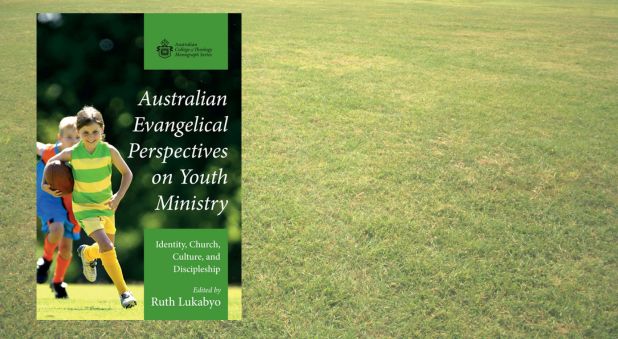Australian Evangelical Perspectives on Youth Ministry (Wipf & Stock)
Edited by Ruth Lukabyo
It is easy to be driven by pragmatics. But to put our theology into the driver’s seat of our ministry practice is a much harder task.
Recently, we were faced with a decision at church. It was wet again, church was over-full again, and the easiest solution was to put all the children on the floor at the front until they went off to kids’ church after the kids’ talk.
I had just read through Australian Evangelical Perspectives on Youth Ministry and viewed this decision with fresh eyes. As Chase Kuhn wrote in his chapter, “How much do these ministries present the cart-before-the-theological-horse approach to church? The responsible challenge is to seek clarity in our theology, working from first principles to refine and revise our ministry practice”.
In reading this book, I revisited so much of the theology and principles that had laid the foundations for my ministry philosophies and practice. I wanted our ecclesiology to drive this decision, not rainy-day pragmatics.
Over the past 20 years, Youthworks’ annual House conference has shaped and sharpened the theology of children’s and youth ministers across Sydney, helping them to develop theological frameworks and principles for best practice and reflect on the implications of these lived out in their weekly ministries. Ruth Lukabyo has collected the rich, clear theology and thinking expressed in these conference papers to produce a book that lays out a Reformed, evangelical, Anglican theology for children’s and youth ministry. It is a fresh perspective that will contribute a strong, clear evangelical voice to the worldwide conversation about youth ministry.
Thirteen authors have contributed papers for the book, and they include faculty of Youthworks and Moore colleges, scholars and experienced practitioners. Each author’s voice is uniquely heard through their paper, but collectively they weave a rich tapestry to display the Reformed theology, biblicism, congregationalism, intergenerationalism and concern for evangelism and discipleship that underpins contemporary Sydney Anglican youth and children’s ministry.
The papers have been collated around the themes of identity, church, culture and discipleship. Many of the questions we face in ministry are explored through these themes, such as what stories are we allowing to shape our view of our children and young people… do we believe they are passive, or active agents, consumers or contributors? How do we help young people shape their identity, interact with the culture around them, and live wisely in the world?
Further, what is the place of children and youth in church when we gather corporately? How do we shape our churches to be intergenerational communities and help our youth stick with their faith? Is “kids’ church” church? What is the place of families and parents in the discipleship of children and young people? What is the history of the Sunday school movement in Australia and how effective was it? How do we talk to children about sin?
Not only do these papers offer deep and rich theological reflection on these questions, they provide thoughtful, clear and practice-based responses. This book is now a must-read for all our students, staff and ministry trainees. If you want to know what is shaping and driving good children’s and youth ministry in Sydney, this book holds your answer!
Returning to our rainy day issue of space, after some theological reflection I had my answer. I believe our children are active members of our gathering. They need to feel warmly welcomed to learn, and they need to be with their parents – and among the adult members – to sing, worship, watch, learn and participate, not be isolated or segregated. So, if we need more space, then we would ask our parents to move with their children and invite other members of the congregation to join them on the floor, too.
The Rev Naomi de Vries is an assistant pastor at the Bridge Church with responsibility for children and families.
























